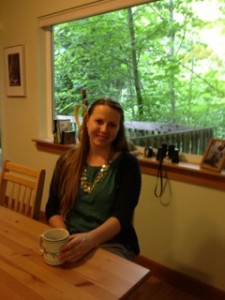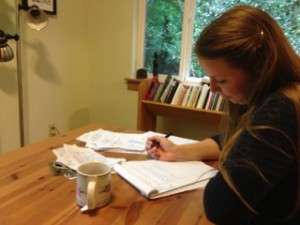Shannon Camlin Ward
Interviewed by Alice Taylor, volunteer
Residency Spring 2013

Have you had other residencies? And, if so, where?
Weymouth Center, in Southern Pines, NC. Vermont Studio Center. Anderson Center, Redwing, MN.
Why did you apply to Hypatia-in-the-Woods?
I’d never been to the Pacific Northwest. I saw this residency on Artists Alliance. I didn’t know what a gem it would be, how special it would be until I got here.
How was this residency different from the others?
There is no social component built into Hypatia-in-the-Woods, as there were with the other residencies. There were 5 to 30 people in the other residencies. This one built more solitude into the routine, which has been amazingly productive for me. That is not to say there’s no opportunity for interaction. There just aren’t the distractions here that there are at other places. It forced me to be more introspective.
Did you learn anything about yourself?
I’ve been trying to expand the things I write about, and write some funny things. One of the things I learned about myself is that I have more of a capacity for humor than I initially thought. I didn’t feel very confident writing anything funny before coming here. I don’t know if I’m ready to share it with the world yet – the funny things I’ve written. I think they need a little more revision. But I gave it try.
I know you have been at Hypatia-in-the-Woods for four weeks. Do you wish it had been a different length and why?
Oh no, I think it is a wonderful length. At the end of every residency I think, “If I just had one more week.” With this one I have the benefit of doing a cross-country trip by myself, so I will have plenty of opportunity to write. And then on to another residency at Yaddo, in Saratoga Springs, New York. Residencies allow me to get so much more work done than I ever do in the academic year. You don’t have the phone ringing, the bills to pay. All those distractions around you. Cleaning. You don’t have to clean your house.
You said “academic year”. Do you teach?
Yes, I teach English composition at Methodist University in Fayetteville, North Carolina, where they are also very good to me. But, you grade 60-70 research papers at the end of the semester and you are pretty brain-dead. There’s not a lot left for writing.
What place in Holly House did you gravitate to? Why?
The kitchen table. The kitchen table is where I tend to write at home. I spend the most time in the kitchen, more than any room in the house. Here, the kitchen is well lit. These windows are beautiful. I can watch the raindrops making their way through the leaves outside.
Do you have a favorite place on the grounds? Why?
The Poetry Trail and labyrinth. I’ve walked the labyrinth most days. I’ve run into lots of little critters – a snake, spiders. There’s the foxglove and blackberries and you get that open view of the sky. The trees are all around. I’ve enjoyed getting to know the nature on the West Coast.
What were the sights, sounds or smells on the grounds that inspired you?
The first two weeks I was here it rained almost constantly, at least a soft drizzle. So I sat right in this spot (kitchen table) and watched those leaves. The rain hit the leaves steadily. It looked like the trees had jazz hands. Everything was shaking just a little bit. The sound of the rain and the sight of those trees drumming with the raindrops, both were poignant.
Are we going to read about those things?
Absolutely. I just incorporated that into a poem yesterday.
What were you most happy to accomplish at Hypatia?
Trying my hand at funny poems.
What was different about what you hoped to accomplish and what you actually accomplished?
I always set barely attainable goals. I came in with this laundry list of poems that I wanted to write. I said I’m going to write one a day but that didn’t quite happen (laughter). I did start to write longer poems – poems that breathe a bit more and weave different threads into themselves. That stretched me as a writer in ways that I have not necessarily stretched myself before.
In general, what influences your work?
Well, obviously my experience influences my work. I just published a chapbook called Blood Creek that weaves in and out of an historical setting that is a renovated slaughterhouse. I grew up in a renovated slaughterhouse, so I have a lot of slaughterhouse poems. And, I had a sister who died of cancer and a pretty traumatic upbringing. Those things filter their way into my poems. That’s the reason I want to write funny poems. Writing started out for me to be catharsis, but is evolving into something else. It’s still cathartic, but I don’t have to write about the things that trouble me. I can write about the things that give me joy, too.
So obviously my experience has influenced me, but also other poets, a lot of other poets. I’ve had great mentors. Dorianne Laux has given me wonderful feedback. Her own poems are great teaching models. And, Michael Colonnese, he was my undergraduate instructor and now a colleague. His poems are incredible. Those are my mentors. And also poets I don’t know. I enjoy Leon Lee’s work. I love Sharon Olds.
What inspired your work the most during your stay?
Fear (laughter). It was a brave thing to come cross-country with another woman and then to stay here for a month by myself. That felt really good. Yet, I’ll hear moths late at night when it’s dark and they are attracted to the light in the cottage. They flail against the windows, making a tapping noise. I’ll investigate and find all is fine. And, my house in North Carolina was robbed while I was here. It’s interesting to have that happen when you are thinking about your own fearful place in the world, and say that I am not going to let my own irrational fears dictate my actions. I am not going to let that keep me from taking this cross-country trip or writing that poem or taking that walk in the woods, or whatever. To have all these personal triumphs, and to be burglarized in the middle of all that. The world is still the world.
When you look back on your experience at Hypatia-in-the-Woods, what memory do you want to keep?
Oh, my goodness. Do I only get to pick one? I don’t think I can pick just one. I had dinner the other night over at Elspeth’s house. I sat with the people she loved, and shared a glass of wine and a good meal, and a lot of laughs. So definitely, I am going to take that with me.
Carolyn (board member) took me to Union to see internationally renowned classical guitarist, Michael Partington. That was absolutely magical, as the sun was setting right over Anna’s Bay and the Olympic Mountains. On the way home, I saw Forest Festival fireworks out the car window. It was a perfect night.
What was the one thing that you wished you had brought that you left at home?
Black pants (laughter). I should have said the Book of Forms. But for practical reasons, black pants because it’s a little bit chilly here and I brought several dresses. But, it’s not really warm enough for dresses. So I ended up buying black pants, because some of the events weren’t jeans-kind-of-events.
But, the Book of Forms, because I am not a form poet. I gravitate to free verse. Form poetry is good for me as an exercise. I just packed all my books in North Carolina because my husband and I are moving to Raleigh. And, so, it was packed away. I miss it.
What was one thing that you brought that you wished you had left at home?
I packed pretty sparsely. I have my iPhone, and I’m so glad I have it. The Internet is almost part of my creative process. It’s like a Swiss Army knife. It’s so useful.
What would you most like to hear people say about the work that you accomplished at Hypatia?
I brought some joy to their day.
What three words would best describe your experience at Hypatia?
Verdant. Introspective. Adventurous.
What advice would you offer to women thinking about applying for a residency?
Have a catalog of things you want to accomplish.
During the school year I get a little brain dead for poetry, but I still get ideas. I jot down a few lines, but I very rarely get a completed poem. I like to keep a running list on my cell phone of the ideas that I get. I have my list for a day when I am not feeling automatically inspired to write. The list is 30 to 40 items long by the end of the academic year. It’s an entire store of good ideas.
About Shannon and her writing
Shannon Camlin Ward was raised in Wilmington, Ohio. She received an MFA in Creative Writing from North Carolina Sate University in 2009, and now teaches composition at her undergraduate alma mater, Methodist University, in Fayetteville, North Carolina. Her poems can be found in The Great River Review, The Superstition Review, and Tar River Poetry. Her chapbook, Blood Creek is available at amazon.com or Longleaf Press. For more of her writing, you can view her website at shannoncamlinward.com. Below is an excerpt from Shannon’s website, describing her arrival to Hypatia-in-the-Woods on the same day as founder, Elspeth Pope’s death.
“The night I arrive, Elspeth passes, so this time, it seems I have wandered into someone’s death. It feels as if I am arriving as the curtain falls on a great play—one I have never seen—the audience still standing in reverential ovation, then shuffling out slowly and leaving me alone with the set: a charming cabin in the woods alongside the house of a generous scholar who made it her mission to provide other women with a creative sanctuary. The stage is still cast in the quiet spell of its absent heroine, and I am surrounded by what she left behind: shelves of books inscribed with heartfelt thanks, paintings, a sculpture, various drawings and prints, journals penned full of poems, musings, and sketches from previous residents, and a handmade box filled with remembrances of those who helped her create this place. A soft, but almost constant rain, chimes through the trees for the next two weeks, shedding white petals from the blackberry brambles and swelling the fruit to a deep red on its way to sweet.”
